Peter MALONE
Saturday, 09 October 2021 13:00
Point Blank/ 2019
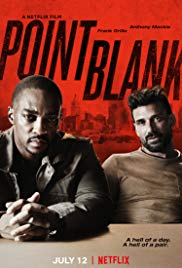
POINT BLANK
US, 2019, 86 minutes, Colour.
Anthony Mackie, Frank Grillo, Marcia Gay Harden, Christian Cooke, Markise Moore, Boris Mc Giver.
Directed by Joe Lynch.
This is a brief thriller, and adaptation to the city of Cincinnati of a French film, Point Blank (A Bout Portant). The action takes place over a short period of time.
The initial focus is on police corruption, the murder of an official, incriminating material on USB, and a criminal fleeing from the house, wounded, picked up by his brother in a car and taken to hospital.
The other focus is on a nurse working in the hospital, his wife pregnant and expecting very soon, taken by the wounded man’s brother and the nurse forced to take wounded man from the hospital, the wife later being taken as hostage and threat.
The tension is on the relationships between the two brothers and their hostages, the nurse having to keep the wounded man going.
Eventually, there is confrontation with the police investigators, a revelation of the mastermind of the corruption.
There is a humorous interlude when the wounded man goes to a drug lord in Cincinnati who has an obsession with movies and they stage a diversion at the police station which the drug lord sees as an achievement in filming.
Anthony Mackie is the nurse. Frank Grillo is the wounded man. Marcia Gay Harden is the chief investigator.
1. Crime and police action in Cincinnati? The remake of a French drama?
2. The short time span of the action? Intensity? Crime, investigation, pursuit, doublecross, the nurse, the pregnant wife? The musical score?
3. The city of Cincinnati, the range of areas, homes, the streets, warehouses, pawnshops, Hospital and interiors, car chases? The police precincts? Atmosphere?
4. The situation, the initial shooting, the dark, Abe and his flight from the house, shot, the pursuit, Mateo waiting for him in the car, driving, going to the hospital? Abe being admitted? Mateo waiting for Abe to escape? The role of the hospital and the staff?
5. Paul, as a nurse, his work, accepted at the hospital? Tending Abe? At home, his wife, pregnant? Mateo coming to the house, the threat to Paul’s wife? Taking her hostage?
6. Abe, his control, threatening Paul? Paul, the police presence, the detectives? His way of getting Abe out of the hospital, and the elevator, the medication? The driving, the pursuits? The action, Paul’s concern, hostility? The old man with his trolley, his helping them escape? At the pawn shop, the shootout, the rogue police? Paul and the gun, shooting the police guard?
7. Mateo, Paul’s wife, his care for her, her struggle to get free? At the warehouse? Lying down? Labour pains coming?
8. The police, police corruption, the revelation of the detective in charge and her manipulations? The flashbacks to the scene in the house, the masked police, the importance of the memory stick all the information on it? Setting up Paul? His escape, the reason for their pursuit?
9. The memory stick, its being hidden?
10. The buildup to the confrontation, Mateo’s death? Abe and his anger?
11. Paul and the bonding with Abe? Abe setting up the fire, with the help of the head of the gang – his personality, his thugs, his being mad over films, action films, a would-be director? Getting his opportunity with the fire and the money shot?
12. Abe, disguised as police, Paul as a nurse, getting into the police precinct? The concern about Paul’s wife giving birth? He being at the station?
13. The confrontation with the detective, the truth, her motivations, the shock of her killing her partner? The fights, her being shot, her being photographed admitting her guilt? Getting it to the television station, it is being played, her watching it as she died?
14. Paul, the birth? Then one year later, the first birthday party – and the card greeting from Abe?
Published in Movie Reviews
Published in
Movie Reviews
Saturday, 09 October 2021 13:00
Galveston
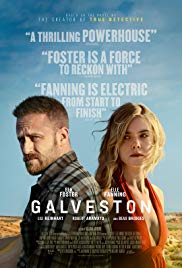
GALVESTON
US, 2018, 91 minutes, Colour.
Ben Foster, Elle Fanning, Beau Bridges, Jeffrey Grover, Lili Reinhart.
Directed by Melanie Laurent.
This is a 21st-century film noir, directed by French actress, Melanie Laurent, who appeared in such films as inglourious Bastards.
This is a story of a criminal, Roy, operating in 1988 in New Orleans, serving his boss played by Beau Bridges. He is diagnosed with lung cancer. He clashes with his boss and is set up to do a raid which, in fact, is designed for his death. However, he escapes, finding the young escort in the house and taking her with him.
She is played by Elle Fanning, making advances, being repelled, stopping to pick up a young girl who turns out to be her daughter, their continuing their travels together to Galveston to lie low.
However, the criminals catch up with them, Elle Fanning’s death, Ben Foster escaping but hurt in an accident, going to prison – and visited 20 years later by the young girl now grown-up who wants the truth about her mother.
A rather dark, grim and dour film, an unusual portrait of a criminal.
1. 21st-century film noir? Critical acclaim? The work of the director, her French perspective on an American story?
2. The framework, the hurricane coming, the sounds, the windows? The flashbacks to the story? Reprising the hurricane at the end?
3. New Orleans, the 1980s, criminals? The setup and the raid? The film on the road, travelling to Galveston? The bars, the motels? Criminal areas? Prison? The musical score?
4. Roy’s story, Ben Foster’s performance? Screen presence? The doctor, the diagnosis, Roy angrily walking out, the cigarettes, the discussions with the boss, the clash? The setup and the raid, his killing his opponents, Roy surviving, the encounter with Rocky, rescuing her? Back home, lending the coat, the going on the road? Roy and the consciousness of his illness?
5. Rocky, her age, background, the escort service and the newspaper advertisement, the discussions with Roy, her advances, his repelling her? Going to the bar, playing pool, the drinks? Going to the house, the shot, coming with the baby girl? The revelation about her stepfather, the rape, rescuing her daughter? At the motel, the rooms, the woman warning about the police, the baby’s nightmares, her coming into the room with the baby and sharing the bed?
6. Roy, returning home, wanting Rocky to go, yet the attraction, walking along the beach and playing?
7. The boss turning up, Roy with the incriminating documents, harsh attitude, taking Rocky, tying up Roy? The woman, freeing him? His wandering, discovering Rocky dead, covering her?
8. The accident, the doctor, his going to prison? 20 years passing? The wrong diagnosis and his surviving?
9. Tiffany, her tracking down Roy, wanting the truth from him, the memories of Rocky, Tiffany’s vague memories, the realisation that Rocky was her mother, had not abandoned her, was dead? Roy explaining, Tiffany’s emotions, the deal then to let him be?
10. A quiet ending, Roy by himself, old, ill, and living with his memories of Rocky?
Published in Movie Reviews
Published in
Movie Reviews
Saturday, 09 October 2021 13:00
Soldiers of Fortune
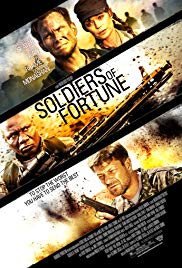
SOLDIERS OF FORTUNE
US, 2012, 95 minutes, Colour.
Christian Slater, Sean Bean, Ving Rhames, Dominic Monaghan, Colm Meaney, Oksana Korostyshevskaya, Charlie Bewley, Ryan Donowho, Freddy Rodriguez, James Cromwell, Gennadi Vengeroc, Sarah Ann Schultz.
Directed by Maxim Korostyshevsky.
This action film lives up to its title, a focus on soldiers of fortune, first seen working in Afghanistan, Christian Slater as a commanding officer with a skill for eliminating the enemy, rescuing his friend played by Freddie Rodriguez.
They are sent home from Afghanistan and spend their time idle, playing cards. However, they are recruited, high pay, to take on mercenary training of a group of wealthy men, played by a range of character actors, Dominic Monaghan is the youngest, an expert in video games getting a taste of reality, with James Cromwell as the oldest.
There are taken to an island in the Black Sea to set up camp. However, the woman who has set them up has vengeance in mind, coming from Black Sea Island, taken over by a tyrant and his sister, exploitation and arms deals. The squad is meant to attack the exploiter and eliminate him and his trafficking.
Colm Meaney is seen in the Afghan sequences, allegedly as a CIA agent. He is not, but an arms dealing business contact. He is now the advisor to the tyrant on the island.
The film spends some time on elaborating the different characters and their backgrounds, Sean Bean is something of a playboy, some Wall Street business executives. However, there is a traitor amongst the group in contact with the arms dealer.
The group is a collection of men rather spoilt by their wealth. There are lots of scenes of their training and the demands on them.
Eventually, there is confrontation, action, the boss and his sister, Colm Meaney again, fighting, some deaths, the buildup to a clifftop confrontation, Slater versus Meaney.
There have been many such films with action leads like Jean- Claude van Damme, Steven Segal, and films about such groups as The Expendables. While this one seems far-fetched, it is nevertheless geared for an action audience.
Published in Movie Reviews
Published in
Movie Reviews
Saturday, 09 October 2021 13:00
Mary and Max
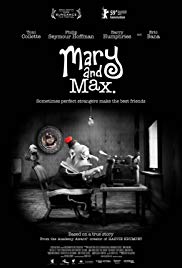
MARY AND MAX
Australia, 2009, 92 minutes, Black-and-white and Colour.
Voices of: Bethany Whitmore, Toni Collette, Philip Seymour Hoffman, Eric Bana, John Flaus, Julie Forsyth, Adam Elliot, Ian Meldrum, Renee Geyer.
Narrated by Barry Humphries.
Directed by Adam Elliott.
An excellent Australian film.
The most immediate impact is the animation, the skill of Adam Elliot (after his Oscar for the short film, Harvey Crumpet – and the continuing wish that he would make another film), the idiosyncratic drawing of his characters, the dingy landscapes of suburban Melbourne in the 1970s and 1980s, the black-and-white skyline of New York City. Another word on those idiosyncratic characters, grotesques. This is a word association with Fellini’s films, performers who looked grotesque in real life, bringing a challenging as well as an alarming range of characters. The characters are, physically, all out of proportion, small and eccentric bodies (with Max as obese), large heads. But, with the voice talent, the characters are alive and communicate themselves as real.
Which means that there is a whole lot of caricature going on. Mary’s mother, Vera, with her dangling cigarette, her fondness for sherry (explaining this away as cups of tea), saying she was borrowing when actually she was shoplifting, is the extreme caricature, no sympathy for her. Norm, Mary’s father, is practically invisible, putting tabs on the products in the factory, retreating to work on the back shed. So, what is Elliot saying about the Australian family?
One answer is that it is parody. We appreciate the reality is we grimace at, life at and with, this portrait of life at Mount Waverley.
It is something the same with the portrait of Max. He is a caricature, a 44-year-old man living alone, with pet fish, obese, a penchant for chocolate hotdogs. But, the caricature elicits some sympathy, moments of compassion, when he explains to us that he has psychological difficulties.
Which means then that this is a tale of aloneness, of isolation, loneliness, very sad aspects of the human condition. Which also means that your narrative comes alive when young Mary decides to send a letter to a ransom address from the phone book, in New York City.
Mary and Max come to more vivid life as we listen to their letters, Mary and her questions, recommending sweetened condensed milk, sending chocolates, and Max sitting at his typewriter, describing the different jobs that he has had, his attendance at help meetings, the advice of his counsellor, communication over the years – and Mary’s later discovery that he had kept every letter, laminated each letter covering the walls of his apartment with the joy of their correspondence.
Adam Elliot wrote the screenplay but the voice-over is narrated by Barry Humphries, a delight to listen to, more in his Sandy Stone vein, quiet reminiscences, and attention to domestic details, but not without some verbal barbs in the Dame Edna vein.
Mary seems to have some hope when she goes to the University and studies Asperges, publishes a book and eagerly sends it to Max who interprets it so badly, so hurt, sending the MP from his typewriter to her – but, the film is not without hope, Mary and Max both in the depths but finding ways to say that they are sorry. Reconciliation is certainly possible. And the pathos of Mary, going to New York, finding Max dead, seeing the laminated letters, realising that, despite the sadness, there had been joy in friendship, breaking through loneliness, in both of their lives.
I would like to add that the marvellous, Bethany Whitmore and then Tony Collette as Mary, Philip Seymour Hoffman voicing Max, Eric Banner as Damian a great number of supporting voice cast. And musical score, the continued delight of all kinds of melodies and songs emerging, sometimes snippets, sometimes commentary on the action – from Prokofiev and Romeo and Juliet to Puccini and the Humming Song, from Zorba the Greek to Que Sera, Sera, the joy of the Typewriting song, That’s Life – and the cheery tones of Bert Kamfaert, That Happy feeling and Swinging Safari. A wonderful commentary on the action in melody and song.
A classic Australian film, classic animation, especially for adults, and a thought-provoker about what it is to be Australian (as well as an isolated New Yorker).
1. Strong reputation, originality, classic animation?
2. The animation style, the characters, caricatures and grotesques, the layout, Melbourne suburbs, New York City, the characters and the proportions, features, movements and gate?
3. The voice talent, the narration by Barry Humphries?
4. The black-and-white photography, touches of red, browns for Victoria, black and white and grey for New York City?
5. The vision of the director, memories of Melbourne and suburbia, the 1970s and 1980s, the look, the home, streets and houses, the factory, shops, library, school, university?
6. The range of the musical score, classics and opera, ballet, popular songs, very music, the typewriter song…? The excerpts and the comment on the action?
7. New York City, life, detail, the vistas, the apartment, the city streets, the meeting places?
8. The intertwining of the stories, editing the two characters and their correspondence and characters? The device of the letters?
9. Mary, as a girl, her appearance, the dot on her forehead, her mother and slatternly behaviour, life at home, going to the shops, her mother and the borrowing, shoplifting, the final pursuit? The father, at the factory, the monotonous work, working in the shed, coming to the house, his death? The old neighbour with agoraphobia? Damien across the street, as a boy, growing up? Mary alone, lonely, the solace of her sweetened condensed milk? The questions?
10. Mary and curiosity, the issues where babies come from, wanting to ask, going to the directory, finding Max’s address, writing the letters, the contents and the questions?
11. Max, 44, obese, Asperge, living alone, eating, the chocolate hotdogs, the chocolate variations, the meetings, his failing, not living up to the recommendations, the focus on the doctor and his opinions and Max quoting them? The fish, their deaths? Replacements? Mr Ravioli, a substitute friend, in the corner, the eventual disappearance? Max and his self-analysis, the nature of Asperges, the lists, the difficulties with emotion? His fixations, cigarette butts, the encounter with the man in the street?
12. The correspondence, over a long time, each answering the other, the TV and liking the Noblets, Max keeping the letters, ironing them, laminating them, on the wall? The sending of chocolates and sharing? Max, his typewriter, the typewriter song? His explaining the details of his jobs, activities? The PS, PPS?
13. Max, being upset, standing in the corner to calm down, his time in the institution and not writing?
14. Mary, keeping the letters secret, her mother finding one on destroying it, Mary finding it, getting the agoraphobic man across the street to collect the mail? Mary’s mother, the sherry, as cups of tea? The borrowing and shoplifting? The absent father? Her delighting in the letters and sharing?
15. Mary as older, her father dying, the funeral, her mother’s reaction? Her collapse? Damien across the street, the attraction? The surgery on Mary’s face, failure? Her study, skills, studying mental conditions, strategies, writing the thesis, the production of the book, sending the copy to Max? Her shock at his upset, sending the key for the letter M, his being hurt?
16. Mary, marrying Damien, the celebration, happiness, pregnancy? The failure with the book, pulping it, the drinking? Damien and his character, emerging as gay, his sheep farmer friend in New Zealand? Mary and her decline, drinking?
17. Max, alone, Mary sending the mug with the apology? His decision to send his Noblets? Her delight in receiving them?
18. Mary’s decision to go to New York, the baby, finding Max dead, the effect, her expressing her reflections on their friendship?
19. The parody and its incisiveness in revealing realities, especially what it is to be Australian, in the city, the suburbs? For a lonely American? Satire with empathy? The
philosophical reflections on the good and the bad, on human nature?
Published in Movie Reviews
Published in
Movie Reviews
Saturday, 09 October 2021 13:00
Star Wars: the Rise of Skywalker
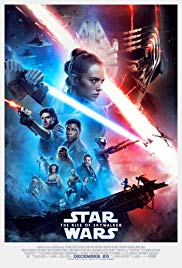
STAR WARS: THE RISE OF SKYWALKER
US, 2019, 142 minutes, Colour.
Daisy Ridley, John Boyega, Oscar Isaac, Adam Driver, Ian McDermid?, Billy Dee Williams, Richard E. Grant, Domnhall Gleason, Keri Russell. And, Carrie Fisher, Mark Hamill, Harrison Ford.
by J.J.Abrams.
Peace at last in the galaxies. And, it has taken 42 years to achieve this, three trilogies, many spin-offs for cinema and television, and billions of souvenir merchandise! Fans of Star Wars should be happy, mission accomplished.
World box office would seem to indicate that everyone is happy. However, checking the critics, digging into the opinions of the bloggers on the IMDb, apparently some of the fans in the over 5000 entries are not happy at all. Condemnations galore But, there was one writer who suggested that they all sit back, relax, watch the film instead of being on the edge of their seat to note every flaw, cataloguing every moment they disapproved of!
This reviewer remembers well the press preview in 1977 of Star Wars, excitement, off into the galaxies, off into another universe. It was pop mythmaking, a blend of comic strip adventures and characters with an enthusiasm for creating this new world. And, of course, there was The Force – and, glad to say, it is still with this final film.
This reviewer would probably fail a test if there were an examination on all the details of the three trilogies. But, that does not matter. This is a review of simply sitting in the cinema, watching what is put before us, surrendering to it, knowing it is not a perfect film (but what is!), accepting it for what it is rather than what obsessive loyalty might demand it to be.
That said, we focus on the character of Rey, introduced in Episode VII, a heroic character who is destined for leadership and greatness. We have followed her exploits, accepted Daisy Ridley as a Jedi leader, watched her being trained by Princess, now General, Leia, inspired by Luke Skywalker when she discovers him in his hermitage exile. We have seen her as an outsider, a wandering scavenger, teaming up with a sometimes-reckless pilot, Poe Dameron (a smiling Oscar Isaac) and a former storm trooper, Finn, (an earnest John Boyega). And, Chewbacca enjoyably back in grunt and action.
This time there are more problems, flights to different planets, friends and making friends of old enemies, technology to be discovered, expeditions, Chewbacca to be rescued, the group rounded up on the major starship, commanded by Richard E.Grant, aided by the obsequious spy (Domnhall Gleeson) and then off to find the wreckage of a vast spacecraft, immersed in a pounding sea and beyond-giant waves.
We are fortunate to have some stock film of Carrie Fisher so she is able to be worked into the plot, desperate, preparing to die, wanting to be reconciled to her son Ben, who in previous films surrendered to the Dark Side and became Kylo Ren (Adam Driver). He confronts Rey, plenty of laser sabre duels, Rey and her appeal to him, an invitation to emerge from the dark.
And, of course, we are very pleased when who should appear to his son but old Han Solo, Harrison Ford pleading with his son. And, as Rey retreats from all the troubles, who should appear to her and urge her on but Luke Skywalker, Mark Hamill himself. And, emerging from the past, Billy Dee Williams as Lando Calrissian helping the cause.
The revelation of the film, which practically everybody knew before they went in, is that Ian McDermid? is back as the Emperor Palpatine, devious dictator who has been manipulating the characters, determined that the Sith should defeat the Jedi, wanting Rey, now discovered as his granddaughter, to kill him, absorb his power, assume the throne.
So, the final Star Wars are the battles against the Emperor and his followers, his defeat, Ben emerging into the light and self-sacrificing, the Allies all gathering and prepared to follow Rey – and an old woman at the end asks her for who she is. She pauses for a long time and claims for herself the name of Skywalker. QED.
1. The completion of the trilogy, of the series? The impact for generations? The heroes, heroics, the life and the galaxies, The Force, good and evil, the Dark Side? Familiarity with the story, the language? Nine episodes? The spin-offs?
2. The narrative, the background of origins, the final chapter, the heritage of the Skywalkers? The role of the evil Emperor? Heroics, war and peace?
3. The cast, and the inclusion of cameos from the original cast? The familiarity and enjoyment of the score? The links to themes? The presence of Chewbacca, 3 CPO, R2D2?
4. Life in the galaxies, the spacecrafts, the planets, the wars, the dark streets of the planets, the deserts, the technology, the battle sequences?
5. Rey, her background, her destiny, hero, her skills, the training, her time with Luke, the training by Leia? The experience with Ben and his becoming Kylo Ren? The friendship with Poe and Finn? Their all being outsiders? Their skills, limitations, missions, confrontations?
6. The Empire, the Emperor, behind the scenes, the revelation to Rey, her parents and memories, her becoming a scavenger, the training, Leia and her becoming a daughter? The power of the Emperor, his plan for succession, the Siths and her becoming a Jedi, the challenge to her?
7. Leia, her role as general, training Rey, the death? The sadness about Kylo Ren? Her reappearance? Luke and his reappearance, his isolation, training Rey? The appearance of Han Solo? And the presence of Lando, still fighting?
8. The ship and the command, the crew, the work of the Empire, the commander and his loyalty, the presence of the spy, his help for the mission, his death? The mission, Chewbacca taken, the plan for the rescue, the dark, the contact and help? The dangers, the group being captured, released by the spy?
9. Rey, the ship, the encounter with Kylo Ren? Her mission, alone, the vast waves, the fighting, the retreat, the encouragement from Luke?
10. Poe and Finn as characters, their backgrounds, desperate, their leadership and skills, the fights?
11. The ultimate Star Wars, the Allies, heroics, tactics and strategies, the technology?
12. Rey and the encounter with the Emperor, her resistance, Ben and his appearance, coming from the dark side, working together, giving his life for Rey? Neighbour fights in
the Emperor’s death?
13. The ultimate victory, peace, the sun shining, new life?
14. Rey, the final questions, her becoming a Jedi, Skywalker?
Published in Movie Reviews
Published in
Movie Reviews
Saturday, 09 October 2021 13:00
Underwater/ 2020

UNDERWATER
US, 2020, 95 minutes, Colour.
Kristin Stewart, Vincent Cassel, T.J.Miller, Jessica Henrwick, John Gallagher Jr, Mamoudou Athie.
Directed by William Eubank.
This action show, with touches of horror, certainly lives up to its name. The underwater is in the depths of the Marianna Trench where energy companies have set up extraordinary plants and processes for searching the ocean floor.
The action is somewhat similar to those films with a group of characters, isolated in space, films like Life, Passengers, but this time in the ocean. If no one can hear you cry in space, what about in the ocean depths!
In one sense, this is familiar material, but it is presented with quite some pace in just over an hour and a half running time. We are introduced immediately to Norah, Kristin Stewart, shaved head, committed to her work, but very quickly experiencing vast explosions, deaths, and a remnant of survivors, a motley lot, with different areas of expertise. And there is the captain, Vincent Cassel playing a straightforward hero type rather than anything sinister. There are some comic touches by T.J. Miller (sometimes a little tiresome given the drastic life and death situation). And there is Jessica Henwick, initially intimidated, but finding the courage to survive.
Just as one can be stranded in space, one can be stranded at the bottom of the Marianna Trench. What to do? What is possible?
The film raises the issue of remaining in place and accepting one’s fate, one’s death or venturing on dangerous paths which will lead to death, sometimes self-sacrificing death, and a remnant surviving.
This surviving group has to make its way along passages on the ocean floor, trying to reach a pod which, if the technology is still functioning (and a lot of the technology is functioning in this story), could propel some survivors to the surface.
However, the writers of the screenplay seem to have a penchant for those old stories of “monsters of the deep�. Who knows what creatures lurk down there, more than 6 miles below the surface? When they gradually appear here, they are, of course, giant. And the question is whether audiences prefer to imagine the monsters or what we actually see, as here, tentacles and teeth and suggestions of some human characteristics.
Of its kind, this is quite entertaining, Kristin Stewart a strong character and presence, dangers, human nobility, fears and terror, and, especially with the final credits, a strong critique of the big business ethos of exploiting nature for financial gain in the name of energy needs.
The screenplay is B-budget about A-budget technology.
1. Title? The ocean depths? The Marianna Trench? Exploration, search for energy sources?
2. The elaborate underwater plant, vast, the interiors, corridors, technical homes, accommodation? The credibility of such plant in such depths? The issue of how it was constructed, power generation, survival?
3. The situation, the credits and the newspaper headlines, the information about the company and its work? The contrast at the end, the headlines, the survivors, top-secret, no interviews, cover-ups? Business exploitation?
4. The introduction to Norah, getting ready for work? Strong personality? The explosions, the consequences, few survivors? Her going into action? Finding Rodrigo, his survival? Their working together? Finding Paul, his being buried, their removing the stones? His going on their quest? Finding Smith and Emily, their work and skills? The finding of the Captain, his personality, his leadership?
5. The issue of remaining with their work, accepting the facts, death?
6. Human survival, finding ways to survive, planning, execution?
7. The captain suggesting the plan, moving along the floor of the ocean, the vehicles? Light and darkness? The technology, the skills in rebooting?
8. The self-sacrifice of the captain? His character, his dead daughter? The loyalties?
9. Paul, the comedy, the difficulties, going through the water, under the rocks, his death?
10. Emily, her fears, technical skills, her being encouraged, her relationship with Smith? Motivation? Nora urging her on? Her changing?
11. Norah, the death of the captain, her determination, her being separated, finding the group, the range of activities? The dysfunction in pod? Her choices for Smith and Emily? Her remaining, Stoicism, self-sacrifice?
12. The presence and threats of the monsters, their attacks, the final appearance, teeth, tentacles, human touches?
13. Smith and Emily, the pods, to the surface, the credits and the issues of their being silenced?
14. A satisfying variation on the underwater theme?
Published in Movie Reviews
Published in
Movie Reviews
Saturday, 09 October 2021 13:00
Cats/ 2019
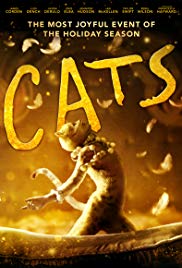
CATS
UK, 2019, 110 minutes, Colour.
Francesca Hayward, Judi Dench, and, Idris Elba, Ian Mc Kellen, Jason Derullo, Naoimh Morgan, Laurie Davidson, Robbie Fairchild, Danny Collins.
Directed by Tom Hooper.
For audiences who enjoyed Cats in the theatre, here is a great opportunity to see it all in close-up. The camera roams over the fantasy set, a blend of London’s Piccadilly Circus and Trafalgar Square, the interiors of the derelict Egyptian Theatre, an opportunity to appreciate the dancing skills, to enjoy the music, to delight in the songs, many familiar, but new interpretations by the performers.
Poet TS Elliot, in whimsical mood, with his Old Possums Book of Practical Cats meets Andrew Lloyd Webber drawing on his range of musical versatility.
This reviewer was not drawn in by Cats when seeing it in the theatre over 30 years ago. Then there was the jolt, some lyrics by Old Deuteronomy (this time rendered more forcefully by Judi Dench in the role): a reprimand to those who ‘have had the experience but missed the meaning’. (And followed by some poetic ruminations on the nature of experience, on the nature of memory, on the nature of meaning.)
For audiences not immediately drawn into the world of Cats, there would be some advice at least to give it a go. After accepting this world of felines, some performance and intrigue, it may be the visuals, the look, the music, some striking performances that entice the unwilling or the suspicious.
Central to Cats is the stranger, Victoria, who comes across the group of Jellicle Cats on the night of the audition when the winner of the competition will get the prize of a new life. Victoria is played by newcomer Francesca Hayward, skilled dancing, pleasing singing, a charming look and presence. And she also gets the opportunity to sing Memories.
While we are getting sorted with which cat is which, we are treated to some incivility with Macavity, sinister, plotting, mean-minded, easily able to disappear in a puff of pink smoke (Idris Elba). There is some humour with Rebel Wilson doing a variation on her Rebel Wilson thing and then James Corden very enjoyable as the large Bustopher Jones.
But, there is the beginning of a wonderful performance by Jennifer Hudson as Grizabella, the exiled cat who had her day in the sun, went off with Macavity, abandoned, derelict in the street and hissed at by the cats. And, of course, Grizabella has her day and Jennifer Hudson’s rendition of Memories, twice, is a powerful showstopper.
The good part of the enjoyment is recognising some of the stars, some unexpected, doing their turns, especially in Ian Mc Kellen has Gus, the theatre cat, giving an enjoyable interpretation of Elliot. The audience has to wait until towards the end we Taylor Swift appears. And, surprisingly, there is Ray Winstone well-known for tough roles and thugs, bringing his rough accent and tone to the villainous Growltiger.
And, of course, there is the delight in seeing and listening to Judi Dench (aged 84 at the time), shuffling as Old Deuteronomy, encouraged by the other cats, the reigning queen of the cats in her wisdom, brought to life, moved by Grizabella, and, looking at us the audience, having the final lyrics of alert and warning.
For lovers of words, there is the increasing number of words that rhyme with cat or cats, even cats with spats!
The film was directed by Tom Hooper who won an Oscar for The King’s Speech, who had a long history in television series and went on to direct the film version of Les Miserables.
This is certainly a way of bringing musical theatre to the screen.
1. The popularity of Cats in the theatre, from the 1980s? Captured for television in the 1990s? A 21st century cinema version?
2. The music of Andrew Lord Webber, his range and popular classic status? The variety of songs and themes in Cats?
3. The lyrics by T.S. Elliot? Old possums Book of Practical Cats? Playful poems from the 1930s? Lloyd Webber’s musical version is?
4. The settings, city of London, the amalgamation of Piccadilly Circus, Trafalgar Square? The streets of Soho? The dingy atmosphere? The old Egyptian Theatre, the interiors? Performance space and design?
5. The idea of Cats, their appearances, hair, human characteristics, dance, movement, singing? The costumes? The make up? The strong criticism of this prior to the opening of the film? However, this design as a way of making the cats credible?
6. The situation, the cats in London, the Jellicle Cats, the yearly gathering, the competition, the winner? The ambitions of the candidates? The cavity and his determination to win, sinister? Victoria by contrast, coming from the outside, wanting to be accepted? The pathos of Grizabella and her being ousted from the cat community?
7. The range of songs, like a concert performance, the use of close-ups, camera movement for movement and dance? The cumulative effect?
8. The cats amongst themselves, the range of characters, their songs, dance? Audiences familiar with some of the cats: Bombalurina, Munkustrap, Rum Tum Tugger, Demeter, Skimbleshanks, Mungojerrie, Rumpleteazer. Mr Mistofelees, Jellylorum?
9. Victoria as central, the outsider, her hopes? Forlorn, befriended by the cats, the magician, her being drawn into the competition, becoming a Jellicle cat?
10. Mavcavity, his appearance, evil, scheming?
11. Grizabella, her being ousted, her singing Memories? The Reprise? The pathos, treatment by Macavity? Her being welcomed into the community?
12. Gus, the theatre cat, Ian Mc Kellen and his skills and charm?
13. Growltiger, Ray Winstone and the role, the thug, violence?
14. Old Deuteronomy, the buildup, the presence of Judi Dench, her presiding, wisdom and judgement?
15. The action, the interaction, the struggle between good and evil?
16. The ending? Grizabella and Memories, her being drawn into the community? The cumulative effect of this theatrical experience transferred to the screen?
Published in Movie Reviews
Published in
Movie Reviews
Saturday, 09 October 2021 13:00
Gentlemen, The
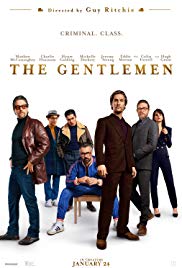
THE GENTLEMEN
UK, 2019, 113 minutes. Colour.
Matthew Mc Conaughey, Charlie Hunnam, Hugh Grant, Colin Farrell, Jeremy Strong, Henry Golding, Michelle Dockery, Eddie Marsan.
Directed by Guy Ritchie.
Some of them might look like gentleman – but they certainly don’t sound like gentleman (a surfeit of swearing which indicates that they are criminals, but might be a bit wearing for some of the potential audience). This is a story about British class.
The film was written and directed by Guy Ritchie who in the late 1990s and early 2000s cornered some of the market in British gangster films, Lock, Stock, and Two Smoking Barrels, Snatch, Rock ‘n’ Rolla and then had success with Robert Downey Jr and Jude law as Sherlock Holmes and Dr Watson. More latterly, he worked for Disney and directed the live-remake of Aladdin.
But he is definitely back in England, back in the criminal world where many of the drug criminals present themselves as gentlemen and even make contacts with the impoverished upper class to fund them by leasing out secret areas of their properties for growing marijuana.
As with Ritchie’s other films, there are strong characters and characterisations combined with a great number of comic touches, playing with some of the conventions of the gangster film for exaggeration and laughs (and some plot twists that we definitely might not have seen coming).
There is an explanation why the American Matthew Mc Conaughey has set up drug operations in London, sent to the University but finding his vocation in drug dealing, growing, and a sometimes suave, sometimes vicious, ability with standover tactics.
However, the story is being told by Fletcher, like the rollout of a screenplay. He is a newshound with an eye to scandal and blackmail. As soon as Fletcher opens his mouth and we see that he is a bespectacled Hugh Grant in this different kind of role for him and not sounding at all like Hugh Grant, much lower class, Grant has already stolen the film and continues to do so right throughout. However, he has some solid competition from Colin Farrell in a supporting role as a sports coach who allows himself to be caught up in the shenanigans as well as the violence. Both Hugh Grant and Colin Farrell are well worth seeing – and hearing.
There are also some very good performances from other members of the cast but they have to play the straight man and woman rolls. There is Charlie Hunnam as Mc Conaughey’s assistant, listening to Fletcher’s story, continually trying to outwit him, and the audience seeing him more active in some of the violent flashbacks. There is Jeremy Strong as an American rival to McConaughey?, wanting to buy him out but, at the same time, wanting to sabotage him so that the price will be lowered. There aren’t many women in The Gentleman, the main female character being McConaughey’s? wife, played in a tough step down from Lady Mary at Downton Abbey.
There are also some Asians in London trying to get in on the act but they are doomed to failure. Henry Golding, remembered from Crazy Rich Asians and Last Christmas, is not so persuasive as an ambitious-to-be drug lord.
The film is very cleverly put together, Fletcher’s story and the range of flashbacks, quite a few twists to save people from deaths, some ironic satire in the characterisations, in the upper and lower class behaviour, quite a literate script (making allowance for such a number of four-letter explosions), that make it all work.
1. The title? Appearances and reality?
2. The London settings, the ordinary world, the criminal world, drug dealing? Using the aristocracy and their estates? Gymnasiums and thugs? The Asian presence? The musical score?
3. The strength of the cast, surprising performances?
4. The style of storytelling, a film script within the script? The range of characters, relationships, motivations, complexities? Fletcher and his prescription, telling the story to Ray? Controlling Ray, the tables turned? The range of twists? Characters turning the tables on each other?
5. Mickey Pearson, from the United States, the outline of his career, coming to Britain to study, becoming involved with drugs, his success, building a career, his organisation? Ray as his deputy? His relationship with his wife, her role in the organisation, her own personal work in sales? The plan to sell his business, the agreements with Matthew, the deals? The role the Chinese, Dry Eye and his uncle? Fletcher and his ability to gain information, his relationship with the editor? The links with the gym, Coach, the thugs? The tangled stories?
6. The Chinese, Dry Eye, his ambitions, his uncle’s control, the interviews, the threats, his discussions with Matthew, their being filmed, the revelation of the plane? Dry Eye and his uncle, turning the tables on him, the uncle’s death? His ambitions, threatening Mickey’s wife, the gun, his death?
7. The deal, the aristocracy, giving land and possibilities for drug cultivation? The range of meetings with the aristocracy, the hidden drug plantations? The breaking, the destruction? The personalities? The Russian connection, the confrontation with the young Russian, falling to his death? The interactions with Coach, his character, the links, control, his helping out, returning again to help Mickey?
8. His wife, her presence in the company, the touch of Lady Macbeth?
9. Hugh Grant’s Fletcher, appearance, accent, his link with the papers, his film script, the discussions with Mickey, the control, the humour, the tables turned on him? The violence?
10. The proprietor, his role, the threats?
11. The drug gangster genre, using the conventions, variations, comic touches, serious? The violence and language and its impact?
Published in Movie Reviews
Published in
Movie Reviews
Saturday, 09 October 2021 13:00
Under the Cover of Cloud
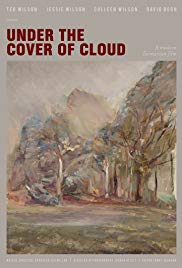
UNDER THE COVER OF CLOUD
Australia, 2018, 88 minutes, Colour.
Ted Wilson and his family and friends.
Directed by Ted Wilson.
This is a very personal film, the work of filmmaker Ted Wilson, reflecting on his own life, visiting his family in Tasmania, a portrait of his interactions with them. It is a kind of film feature of reality television style which may not have a wide appeal.
The film does use Tasmania locations to advantage, not so much the city of Hobart, but the range of surrounding countryside, coast.
Ted Wilson shows himself as a reporter, losing his job, deciding to return home, some plans to write a book about cricket and Tasmania, and a desire to make contact with veteran cricketer, David Boon.
Ted himself is very much at the centre of the film, a visual autobiography. He stays with one of his brothers and the family, plenty of family sequences. He goes to visit his mother, his sister coming in from Adelaide for a visit. He makes contact with his other brother and his brother’s wife, some meal scenes, some family backyard games.
In some ways the narrative picks up with the introduction of Ted’s mother, a fairly forthright woman. There is an attention to detail, a great deal of time given to Ted’s helping his mother with a troublesome branch and getting it under control.
And there is a reward with a meeting and conversation with David Boon.
It would seem that the film has a limited appeal, with the confines of the action to Ted and his family, as well as the sometimes minute detail of domestic action.
Published in Movie Reviews
Published in
Movie Reviews
Saturday, 09 October 2021 13:00
Go!/ 2020
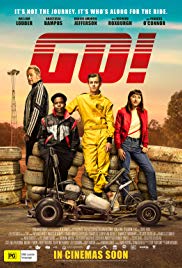
GO!
Australia, 2020, 102 minutes, Colour.
William Lodder, Richard Roxburgh, Frances O' Connor, Anastasia Bampos, Dan Wyllie, Cooper van Grootel, Damien de Montemas, Darius Amarfio Jefferson.
Directed by Owen Trevor.
Certainly an energetic title. And, in fact, this is quite an energetic film. It is a film designed for the family, youngsters enjoying the action, teenagers identifying with the central characters, some tough family situations, some valuable lessons in understanding oneself, the role of parents, the role of mentors.
This is a film from Western Australia, very proud of its locations, promoting state and national Go- Kart competitions. Starring as the mother is Frances O’ Connor whose family migrated to Western Australia where she grew up. The film is a kind of welcome home to her. The other adult star of the film is Richard Roxburgh, the veteran driver who is rather disillusioned, disappointed in life, running a Go- Kart track and being challenged to become a mentor.
But, it is the teenagers that we focus on. Jack (William Lodder, in his only role so far) arrives with his widowed mother and precious memories of time with his dead father, into the small town of Busselton where his mother intends to set up a shop as Well Is renovate a house for their home – which she does. In the meantime, she urges Jack to go to a party, a party for Mandy (Anastasia Bampos also her only role so far) at the track. He meets a young aboriginal friend, Colin Darius Amarfio Jefferson), who is bullied by Mandy’s brother and some of the locals.
Jack immediately wants to participate in the race, full of exhilaration. And, this is his story, plenty of ups, plenty of downs, the kind of issues familiar from this kind of film where we know, ultimately, he will be successful.
While Richard Roxburgh as Patrick acts in an expected way, he is still different, reluctant to help Jack, not wanting any backchat, getting him to do menial jobs and repaying him with rides around the track. Eventually, there are many scenes of training and wise advice for those contemplating a Go-Kart? amateur career or professional career!
The trouble is that Mandy is the daughter of the local entrepreneur whose bullying son assumes that he will be champion. Father and son are chauvinist and ignore Mandy’s talents with machines. Jack doesn’t and she becomes part of the team.
Meanwhile there is a pleasantly awkward romantic set up with the local policeman, inevitably named Barry (Daniel Wyllie) and Jake set setting him up for a date with his mother, much awkwardness and all.
Some of the races don’t go as planned, Jack discovering how stubborn he can be, wanting to beat his rival at all costs – but Patrick explaining anger and “red mist� advising him to count backwards from five in order to clear his vision and motivation.
In many ways, this is a formula film (whatever formula number Go- Kart racing has) but, the plot and the performances are much better than usual, meaning that even elderly audiences might be drawn in to enjoy a family outing.
1. The title? Action? Go- Karts? Racing and competitions?
2. The Western Australian settings, the town, homes, shops, streets, mechanics, the racetrack? The musical score?
3. The target audience? Youngsters? Families?
4. Christie and Jack arriving in town, the car, the house, needing repairs, going to the shop, setting it up? The dead father? Jack and his memories, his grief, keeping it in? His mother encouraging him to speak? The new life in the town?
5. Mandy, her party, Dean and his racing, the pressure from their father? Jack going, meeting Colin, getting into the uniform, the go-karts, racing? Patrick watching? Dean and his success? State prospects, National prospects?
6. Jack and his ambition, the experience of Dean and his friends? The race, competitiveness, going on the outside, the pebbles, his crashing? Patrick’s reaction?
7. Patrick, in the caravan, his past career, memories, keeping to himself? The guitar and Jack breaking the string? Mike Zeta, his request for training Dean? Patrick’s refusal, saying that he lacked the talent?
8. Jack, the bond with his mother, her setting up the shop, her patience with her son and love for him? Jack and the donuts, Barry and his taking him home, his mother upset?
9. Barry, with his speedometer, Jack cycling past? Jack and his idea, talking to Barry about a possible date, Barry awkward, living with his mother, getting information, actually proposing the date? Christie agreeing? Her knowing that Jack put him up to it? Their walk along the beach, the outing, Barry singing the Daryl Braithwaite song? The beginning of the friendship?
10. Jack, going to see Patrick, trying to persuade him to let him ride, the cleanup? Patrick thinking, his chop chop response? The seemingly menial tasks? Patrick and his later explanation for their strengthening muscles? Hard work, Patrick letting him ride?
11. Jack, cleaning the rubbish, the makings of a go-kart, the friendship with Mandy, getting her to help? The continued friendship with Colin? Their preparing the go-kart, the uniform? Going into the race? His anger with Dean? The crash, the second-place disqualified, Jack and able to go the national race?
12. Mandy, working for her father, her suggestions for improvement, their being ignored? Her blunt talking to Dean? Working with Jack? Dean and his gang wrecking the kart? Mandy deciding to help? Their stealing the piece from her father shop?
13. Jack, his anger, hurting Colin, hurting Mandy? The apology to Colin? The double please to Mandy?
14. The issue of anger, Patrick’s explanation about red mist, counting backwards from five, Jack using it during the race, his tricking Dean and overtaking him? Dean shaking hands on the stand? Everyone happy in the crowd of spectators?
15. The achievement? Jack claiming that he had drawn Patrick out of his caravan in retirement? Patrick explaining his story, the death of his friend? Mike Zeta and his congratulations?
16. Happy prospects?
Published in Movie Reviews
Published in
Movie Reviews